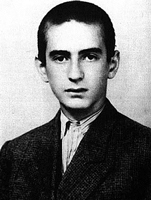
Source: Elie Wiesel, blog post, debaronson.com
In the last section you read a short nonfiction piece focusing on connotation and denotation, so let’s tackle a speech. Speeches are a good way to analyze diction and tone. Remember diction and tone are stylistic devices that help the listener “feel” what it is the speaker is trying to say. Tone is largely determined by diction—the words that are chosen by the writer. (Remember the example from earlier; “chick” can be positive or negative depending on how you use it.)
Speakers know how to use connotation to evoke emotions in the listeners. The following speech by Elie Wiesel was presented in the East Room of the White House on April 12, 1999. Wiesel is a Holocaust survivor and Nobel Laureate and was a guest of President Bill Clinton and First Lady Hillary Rodham Clinton. At the time of this speech, ethnic cleansing was occurring in Kosovo.

Source: Elie Wiesel age 15, Library of Chicago, Wikimedia Commons
Mr. Wiesel has an extraordinary background. In 1944, Elie Wiesel and his family were deported by the Nazis to Auschwitz, a Nazi extermination camp. As a teenager, Wiesel worked in the rubber factory with his father and lived off of soup and bread. He lived with brutal discipline and at one time received 25 lashes by whip. In 1945, Wiesel and his father were evacuated from Auschwitz and forced to Buchenwald, another brutal concentration camp. At Buchenwald, Wiesel’s father, mother, and sister died. In April 1945, American troops liberated those held at Buchenwald, and Wiesel moved to Paris, then to New York. In 1960, Wiesel wrote Night, the autobiographical account of his Holocaust experience.
For this exercise, follow these steps:
- Download and print the following document: Elie Wiesel: The Perils of Indifference. (Note: You may have to save it to your computer before you print it.)
- Click on this link to listen to the entire speech.
- As you listen to the speech, annotate the text as you find words that have a connotative meaning. “Annotate” means that you should highlight words and make notes in the margins regarding your thoughts or emotions as you read. Also, you may have to listen to the speech more than once.
Next, focus on the beginning of the speech to review your understanding of how a writer uses word choices to convey attitude or tone to listeners or readers.
In the second paragraph, Wiesel describes his liberation from Buchenwald:
“Liberated a day earlier by American soldiers, he remembers their rage at what they saw. Even if he lives to be a very old man, he will always be grateful to them for that rage and also for their compassion. Though he did not understand their language, their eyes told him what he needed to know—that they, too, would remember, and bear witness.”
Why do you think Wiesel uses the word “rage”? Would another word such as “sadness” or “anger” work? Wiesel uses “rage” instead of “anger” because the abuse of humans and the injustice of human rights go beyond the emotions of sadness or sorrow. The mistreatment of another human being in such a deplorable environment angers the American soldiers, angers them to the point of forever remembering the situation, the people who have died, and those who have survived. Rage is an emotion found in every culture and language; it’s universal. For this reason, Wiesel knows that the audience listening to him will understand the significance of his pain and suffering while in the camps when he chooses the word “rage.”
Now that you have listened, read, and analyzed “The Perils of Indifference,” answer the following questions by clicking on the correct response. If you choose incorrectly, try again.
- In paragraphs two and three, why is the multiple meaning of the word “gratitude” important?
- The second paragraph suggests a tone of—
- The speech’s setting (the White House) is significant because it helps contrast—
- Beginning with paragraph four, the author’s tone shifts from—
- By saying that indifference can be “seductive” in paragraph six, Wiesel implies that—
- Why do you think Wiesel chose to use the word “seductive” in paragraph six to describe the power that indifference has over us?
- In the 15th paragraph, Wiesel calls President Roosevelt “the illustrious occupant” of the White House. What is the connotation of the word “occupant”?
- The author’s purpose for giving this speech was most likely to—
- The tone of this speech can best be described as—